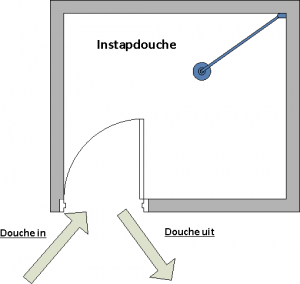The shower(s) in the hygiene lock must comply with a specific layout, in accordance with the IKB Kip regulations (Annex 1.2). The layout consists of three separate areas: the undressing area, the shower and the dressing area. This specific layout is called a ‘walk-through shower’. This type of shower creates a clear separation between the unclean and clean zones of the farm (see image below). As a result, there is no contact between walking routes, provided the system is properly observed, and the risk of cross-contamination is reduced. The walk-through shower therefore reduces the risk of introducing animal diseases and other pathogens onto your establishment and transmitting them to other companies.

The shower areas must be well-lit and heated and offer the necessary privacy for the visitor to shower comfortably and at his/her ease. If you regularly receive several visitors to your farm, you could consider providing more than one shower.
The various areas of the walk-through shower consist of the following:
Undressing area
- hooks and/or shelf to hang up/place the visitor’s clothing
- clean towels (to be used when showering on departure)
- a laundry basket for used towels
- you can also decide to provide lockers or other options to securely store personal belongings
Shower
- connected to mains water or an own water source of suitable quality
- properly functioning drain and shampoo and/or soap
Dressing area
- clean towels, a laundry basket and a waste bin
- clean clothing provided on site for the visitor to wear, footwear, socks and underwear
- personal protective equipment such as mouth mask and hairnet
More information about the full regulations regarding the shower? Click here (Annex 1.2)
Transitional period 1 July 2028
Do you already have a shower on your plot, but the shower does not comply with the walk-through principle? In this case a transitional period until1 July 2028 applies. This is usually an ordinary style shower (same side in and out). In that case from 1 July 2028 you will also be obliged to provide walk-through shower facilities, in compliance with the IKB Kip regulations. Ordinary style showers only have one door, so there is no physical separation between the unclean and clean zones. This means the walking routes overlap so there is the risk of cross-contamination.

Legionella control plan
When the shower is used, it is important to make sure the shower is safe and clean. The regulations therefore include a provision stating that poultry farmers must have a legionella control plan. Your plan must comply with at least the requirements set out in the IKB Kip Legionella Control Protocol (click here to find the protocol of IKB Kip). A number of important aspects mentioned in the protocol are listed below:
- the shower must be connected to potable water from the water supply company or a source of good quality water;
- absence of “dead legs” in the system;
- weekly use of all taps (flush for at least two minutes per tap).
If a legionella infection is detected, the shower must no longer be used and a professional company must be contacted. Legionella is harmful to both your health and the visitor’s health. The shower can only be used again safely when a professional company has determined that the concentration of the legionella bacteria in the pipes no longer exceeds the standard of 1,000 colony-forming units per litre. Only then can you and your visitor use the shower again safely.